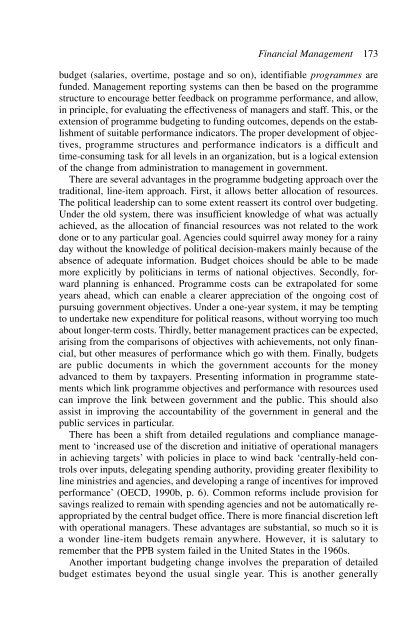Public Management and Administration - Owen E.hughes
Public Management and Administration - Owen E.hughes
Public Management and Administration - Owen E.hughes
Create successful ePaper yourself
Turn your PDF publications into a flip-book with our unique Google optimized e-Paper software.
Financial <strong>Management</strong> 173<br />
budget (salaries, overtime, postage <strong>and</strong> so on), identifiable programmes are<br />
funded. <strong>Management</strong> reporting systems can then be based on the programme<br />
structure to encourage better feedback on programme performance, <strong>and</strong> allow,<br />
in principle, for evaluating the effectiveness of managers <strong>and</strong> staff. This, or the<br />
extension of programme budgeting to funding outcomes, depends on the establishment<br />
of suitable performance indicators. The proper development of objectives,<br />
programme structures <strong>and</strong> performance indicators is a difficult <strong>and</strong><br />
time-consuming task for all levels in an organization, but is a logical extension<br />
of the change from administration to management in government.<br />
There are several advantages in the programme budgeting approach over the<br />
traditional, line-item approach. First, it allows better allocation of resources.<br />
The political leadership can to some extent reassert its control over budgeting.<br />
Under the old system, there was insufficient knowledge of what was actually<br />
achieved, as the allocation of financial resources was not related to the work<br />
done or to any particular goal. Agencies could squirrel away money for a rainy<br />
day without the knowledge of political decision-makers mainly because of the<br />
absence of adequate information. Budget choices should be able to be made<br />
more explicitly by politicians in terms of national objectives. Secondly, forward<br />
planning is enhanced. Programme costs can be extrapolated for some<br />
years ahead, which can enable a clearer appreciation of the ongoing cost of<br />
pursuing government objectives. Under a one-year system, it may be tempting<br />
to undertake new expenditure for political reasons, without worrying too much<br />
about longer-term costs. Thirdly, better management practices can be expected,<br />
arising from the comparisons of objectives with achievements, not only financial,<br />
but other measures of performance which go with them. Finally, budgets<br />
are public documents in which the government accounts for the money<br />
advanced to them by taxpayers. Presenting information in programme statements<br />
which link programme objectives <strong>and</strong> performance with resources used<br />
can improve the link between government <strong>and</strong> the public. This should also<br />
assist in improving the accountability of the government in general <strong>and</strong> the<br />
public services in particular.<br />
There has been a shift from detailed regulations <strong>and</strong> compliance management<br />
to ‘increased use of the discretion <strong>and</strong> initiative of operational managers<br />
in achieving targets’ with policies in place to wind back ‘centrally-held controls<br />
over inputs, delegating spending authority, providing greater flexibility to<br />
line ministries <strong>and</strong> agencies, <strong>and</strong> developing a range of incentives for improved<br />
performance’ (OECD, 1990b, p. 6). Common reforms include provision for<br />
savings realized to remain with spending agencies <strong>and</strong> not be automatically reappropriated<br />
by the central budget office. There is more financial discretion left<br />
with operational managers. These advantages are substantial, so much so it is<br />
a wonder line-item budgets remain anywhere. However, it is salutary to<br />
remember that the PPB system failed in the United States in the 1960s.<br />
Another important budgeting change involves the preparation of detailed<br />
budget estimates beyond the usual single year. This is another generally











